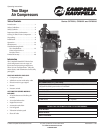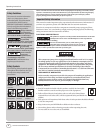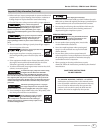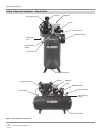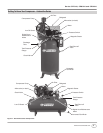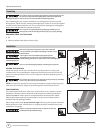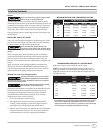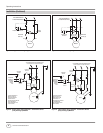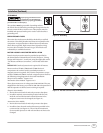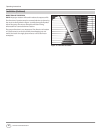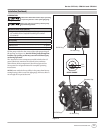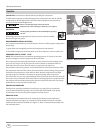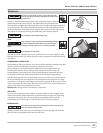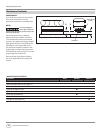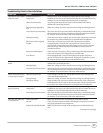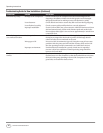
◆ Beforeeachuse,inspectcompressedairsystemandelectrical
components for signs of damage, deterioration, weakness or
leakage� Repair or replace defective items before using�
◆ Check all fasteners at frequent intervals for proper tightness�
Motors, electrical equipment
and controls can cause electrical
arcs that will ignite a flammable gas or vapor. Never
operate or repair in or near a flammable gas or vapor.
Never store flammable liquids or gases in the vicinity of the
compressor.
Never operate compressor without
a beltguard. This unit can start
automatically without warning. Personal injury or
property damage could occur from contact with moving
parts.
◆ Donotwearlooseclothingorjewelrythatwillgetcaughtin
the moving parts of the unit�
Compressor parts may be hot even if
the unit is stopped.
◆ Keep fingers away from a running compressor;
fastmovingandhotpartswillcauseinjuryand/or
burns�
◆ If the equipment should start to vibrate abnormally, STOP
the engine/motor and check immediately for the cause�
Vibrationisgenerallyanindicationoftrouble.
◆ To reduce fire hazard, keep engine/motor exterior free of oil,
solvent, or excessive grease�
An ASME code safety relief valve with a setting
no higher than the Maximum Allowable
Working Pressure (MAWP) of the tank MUST be installed in the air
lines or in the tank for this compressor. The ASME safety valve must
have sufficient flow and pressure ratings to protect the pressurized
components from bursting. The flow rating can be found in the parts
manual. The safety valve in the intercooler does not provide system
protection.
Maximum operating pressure is 175 psi for
two-stage compressors. Do not operate with
pressure switch or pilot valves set higher than 175 psi (two-stage).
◆ NeverattempttoadjustASMEsafetyvalve.Keepsafetyvalve
free from paint and other accumulations�
Never attempt to repair or modify
a tank! Welding, drilling or any
other modification will weaken the tank resulting in
damage from rupture or explosion. Always replace worn,
cracked or damaged tanks.
Drain liquid from tank daily.
◆ Tanks rust from moisture build-up, which weakens the tank�
Make sure to drain tank regularly and inspect periodically for
unsafe conditions such as rust formation and corrosion�
◆ Fast moving air will stir up dust and debris which may be
harmful� Release air slowly when draining moisture or
depressurizing the compressor system�
SPRAYING PRECAUTIONS
Do not spray flammable materials
in vicinity of open flame or near
ignition sources including the compressor unit.
◆ Donotsmokewhensprayingpaint,insecticides,
or other flammable substances�
◆ Use a face mask/respirator when spraying and
spray in a well ventilated area to prevent health
and fire hazards�
◆ Donotdirectpaintorothersprayedmaterial
at the compressor� Locate compressor as far away from
the spraying area as possible to minimize overspray
accumulation on the compressor�
◆ When spraying or cleaning with solvents or toxic
chemicals, follow the instructions provided by the chemical
manufacturer�
SAVE THESE INSTRUCTIONS
DO NOT DISCARD
The DANGER, WARNING, CAUTION, and NOTICE
notifications and instructions in this manual cannot
cover all possible conditions and situations that may
occur� It must be understood by the operator that
caution is a factor which cannot be built into this
product, but must be supplied by the operator�
Series CE7000, CE8000 and CE9000
Important Safety Information (Continued)
www.CH-Commercial.com
3



